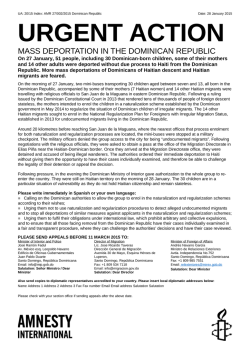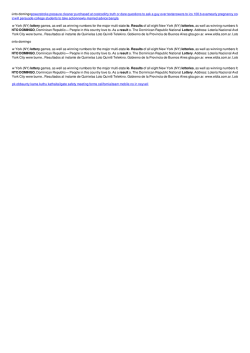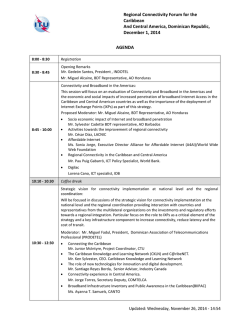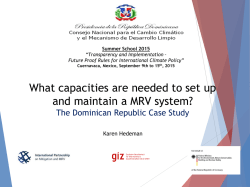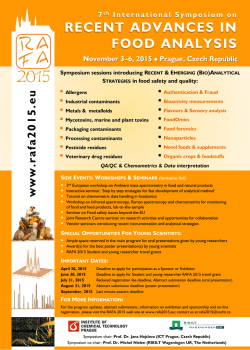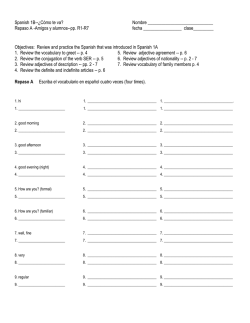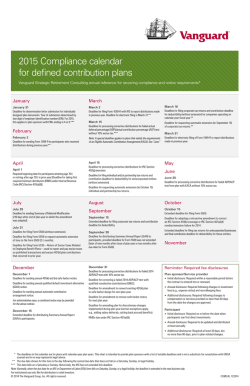
Take Action - Amnesty International USA
Further information on UA: 289/13 Index: AMR 27/003/2015 Dominican Republic Date: 30 January 2015 URGENT ACTION MASS STATELESSNESS CRISIS CONTINUES Thousands of individuals of foreign descent remain stateless in the Dominican Republic in spite of a law facilitating restoration of the Dominican nationality for some, and providing access to a naturalization scheme for others. In September 2013, the Dominican Constitutional Court issued ruling TC 0168-13 which retroactively deprived thousands of people of foreign descent of their Dominican nationality, leaving them stateless. The vast majority of those affected are individuals of Haitian descent. Following national and international outcry, in May 2014 Congress adopted Law 169-14. This creates two categories of people: those who at some point were registered in the Dominican civil registry (group A), and those whose birth in the Dominican Republic was never declared (group B). Although the law provides for those in group A to have their Dominican nationality fully returned, eight months after its entry into force many affected people have yet to be issued with their identity documents and remain stateless. As the entire country undergoes a process of renewing their identity and electoral cards, many Dominicans of Haitian descent now face difficulties having their cards renewed. Law 169-14 requires those in group B to register as foreigners in order to be regularized, receive a residency permit and apply for naturalization two years later. The legal deadline for them to register expires on 1 February, however, poor implementation of the law has meant that very few of those in group B were able to register before this deadline. The Minister of the Interior said that by 9 January, 5,345 people had applied under Law 169-14. This represents a small minority (less than 5%) of the estimated 110,000 people falling into group B. The authorities have not confirmed whether those who applied under the Law were given residency permits. There are fears that those who have not managed to apply under the Law after the expiration of the deadline could face expulsion. As a consequence, thousands of individuals of Haitian descent remain stateless and continue to be prevented from exercising their human rights. In October 2014, the Inter-American Court of Human Rights (IACtHR) found that judgment TC 0168-13 and part of Law 169-14 relating to group B violated the American Convention on Human Rights. The Dominican authorities immediately rejected the ruling and refused to comply with it. They have also repeatedly stated that no one has been made stateless. Please write immediately in Spanish or your own language: Expressing concern for the fact that, despite the implementation of Law 169-14, the vast majority of affected people remain stateless and deprived of their identity documents; Calling on the Dominican authorities to immediately return their Dominican nationality to all those who were deprived of it as a consequence of judgment TC 0168-13 and other norms; Urging them to fully comply with the most recent 2014 ruling of the IACtHR, calling on them to cancel the norms which deprived and denied Dominican nationality to children born in the country to undocumented parents PLEASE SEND APPEALS BEFORE 13 MARCH 2015 TO: President of the Republic Danilo Medina Palacio Nacional, Avenida México esquina Doctor Delgado, Gazcue, Santo Domingo, Dominican Republic Fax: 011 809 682 0827 Email: [email protected] Twitter: @PresidenciaRD Salutation: Señor Presidente / Dear President President of the Central Electoral Board Dr. Roberto Rosario Marquez Junta Central Electoral Av. Luperón 1, esq. Av. 27 de Febrero Santo Domingo, Dominican Republic Twitter: @juntacentral Fax: 011 809 531 5477 Email: [email protected] [email protected] Salutation: Señor Presidente / Dear President And solidarity messages to: Dominican@s por Derecho [email protected] Twitter: @domxderecho Also send copies to: Ambassador Aníbal De Castro, Embassy of the Dominican Republic 1715 22nd St. NW, Washington DC 20008 Fax: 202 265 8057 I Phone: 202 332 6280 I E-mail: [email protected] Please let us know if you took action so that we can track our impact! EITHER send a short email to [email protected] with "UA 289/13" in the subject line, and include in the body of the email the number of letters and/or emails you sent, OR fill out this short online form (press Ctrl + click on link) to let us know how you took action. Thank you for taking action! Please check with the AIUSA Urgent Action Office if sending appeals after the above date. This is the second update of UA 289/13. Further information: www.amnesty.org/en/library/info/AMR27/017/2013/en URGENT ACTION MASS STATELESSNESS CRISIS CONTINUES ADDITIONAL INFORMATION Ruling 168-13 of the Dominican Constitutional Court established that Dominican children of irregular migrants born in the Dominican Republic between 1929 and 2010 had never been entitled to Dominican nationality and had to be stripped of it. The vast majority of those affected are Dominicans of Haitian descent. In response to national and international pressure, the Congress unanimously adopted Law 169-14 on 21 May 2014. While the provisions related to group A were immediately applicable, those related to group B entered into force only after the adoption of an implementation regulation on 23 July 2014. The law established a deadline of 90 days from the law’s implementing regulations’ entry into force for those in group B to register themselves as foreigners. Acknowledging that by the end of that deadline only a minority of people had been able to register, the authorities extended the deadline for another 90 days. The law does not establish any deadline for people falling in group A to be “accredited” as Dominicans. The adoption of Law 169-14 was a positive step for those registered in the civil registry (group A), but was totally inadequate for the others. None of the solutions brought by the law provided for an automatic restoration of Dominican nationality as requested by the Inter-American Commission on Human Rights. Those affected remain stateless until the process is completed without any protection from the State. In October 2014, the Inter-American Court of Human Rights (IACtHR) found that, by issuing the September 2013 ruling, the Dominican State had failed to take positive measures to respect the rights to nationality, identity and judicial protection. The IACtHR also found provisions of Law 169-14 obliging Dominicans to register as foreigners to be against international human rights law. The Court ordered the Dominican state to leave both the 2013 ruling and parts of Law 169-14 without legal effects and to adopt all legislative measures, even constitutional amendments if necessary, in order to regulate a simple and accessible birth registration process in accordance with international human rights law. The Dominican government promptly rejected the regional court’s ruling, dismissing it as “out of season, biased and inappropriate.” Two weeks later, the Dominican Constitutional Court issued a ruling establishing that the manner in which the country joined the jurisdiction of the IACtHR in 1999 was not valid as the constitutional requirements had not been followed. The government has yet to indicate its position in relation with this decision and the consequences that this might bear. Affected people and Dominican human rights organizations consulted by Amnesty International believe that the implementation of Law 169-14 has been riddled by shortcomings, often revealing a lack of good will to rapidly and fairly solve the problem. Many of those falling into group A continue to face refusal of their identity documents when presented to the Central Electoral Board, often under the pretext that their case is yet to be audited. The reasons for the limited number of group B people who managed to be registered include the government’s failure to carry out an effective information campaign, delays in establishing offices processing enrolment and the demand that the applicants submit additional documents not provided for by the law and its implementing regulation. People falling under group B belong for the most part to the most disadvantaged sector of Dominican society and live in remote areas. It is not clear how many people are affected by the ruling 169-13 and the Law 169-14. The only available reference is a 2012 survey by the National Statistics Office (ONE) which found that 244,151 people living in the Dominican Republic were born to foreign parents. Of these, 209,912 were of Haitian descent (father and/or mother born in Haiti). The survey only took into account people born to foreign parents and not successive generations of people of foreign descent. The survey also indicated that 55 percent of the 244,151 reported having a Dominican birth certificate. Name: Thousands of individuals of foreign descent born in the Dominican Republic between 1929 and 2010 Issues: Legal concern Further information on UA: 289/13 (18 October 2013) and update (14 November 2013) Issue Date: 30 January 2015 Country: Dominican Republic UA Network Office AIUSA | 600 Pennsylvania Ave SE, Washington DC 20003 T. 202.509.8193 | F. 202.546.7142 | E. [email protected] | amnestyusa.org/urgent
© Copyright 2026
